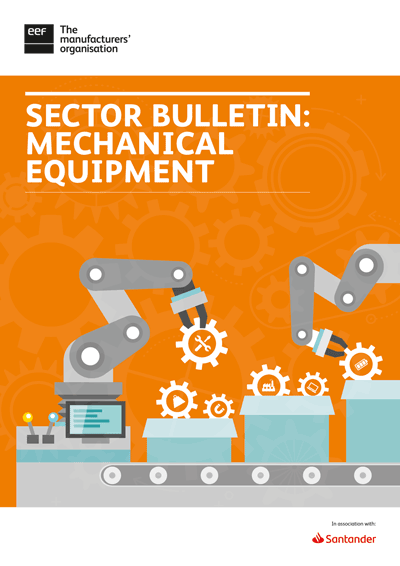 EEF/Santander report says industry 4.0 technologies and renewable energy will underpin growth in the sector. David Fowler reports
EEF/Santander report says industry 4.0 technologies and renewable energy will underpin growth in the sector. David Fowler reports
Automation, Industry 4.0 technologies and demand for renewable energy present long-term opportunities for growth in the UK’s mechanical equipment industry.
The report notes that mechanical equipment has been lagging behind other sectors, such as aerospace and chemicals, in adopting intelligent manufacturing processes.
It adds that opportunities in the short term will arise from increasing the size of the after-sales and service market, offering new funding models such as leasing, and fulfilling demand from the global construction equipment industry.
The mechanical equipment sector is the UK’s second biggest manufacturing employer, worth £11bn to the UK economy. It makes machines and equipment which are used as the means of production by other industries, including machine tools and other metal-forming machinery; equipment for construction, agriculture and mining; equipment for public utilities, such as pumps used in water distribution or turbines for energy production; and a range of supporting equipment for all sectors of the economy, from equipment for heating and ventilating buildings, to fork-lift trucks.
The report says that the sector has evolved and moved with the times over more than a century. This should continue over coming decades as Industry 4.0, the internet of things and Big Data continue to grow in importance.
The IoT and the associated move to cloud computing and smart sensors are revolutionising factory floors, providing real-time data and helping to improve efficiency and speed of production, as well as reduce waste, it adds. Big Data analysis can help manufacturers to improve operations and reduce costs, for instance by identifying bottlenecks in production. Such technologies will be crucial to improving the productivity of mechanical equipment manufacturers, which have lagged behind other sectors such as aerospace and chemicals in adopting intelligent manufacturing techniques.
Automation is also transforming the sector, allowing machines to carry out higher value and higher skilled work rather than replacing humans in tedious and repetitive tasks. But the report adds: “One of the greatest benefits of automation in the mechanical equipment sector is its ability to provide safer working environments [by replacing humans] in dangerous or unsuitable situations” – for example autonomous dump trucks eliminating human drivers on construction or mining sites.
The report predicts that UK government schemes including the Clean Growth Strategy, and carbon budgets, which have the aim of reducing greenhouse gas emissions by 80% by 2050, will result in renewable energy technology growing rapidly in importance. “Mechanical equipment manufacturers, and in particular specialised oil extraction equipment manufacturers, will need to adapt and focus on the equipment needed for the production and distribution of renewable energy equipment – for example, hydro-electrical turbines, fuel cells and biomass systems,” it says.
The report identifies three opportunities in the near term. First, the nature of mechanical equipment products – as capital investment by other businesses – means they tend to have longer lifespans than products in other branches of manufacturing. This has led to the after sales industry, and “servitisation” business models, growing in importance for the sector.
The second lies in adopting new financial models such as leasing. Purchasing mechanical equipment represents an important investment for the future productivity of the sector’s clients, but may not always be viable. This has led to some big companies in the mechanical equipment market starting to use their size, and financial clout, to offer finance plans in order to increase their sales and revenues, and to provide an additional service to clients.
Third, the global construction equipment market is set to grow to a value of $180.7bn by 2021. This would equal a 7% compound annual growth rate since 2015, and represents a major opportunity for specialised construction equipment manufacturers in the UK.
The report emphasises that overseas trade is essential to the mechanical equipment sector’s standing and performance. Some 55% of all UK firms in the sector are classified as either an importer or exporter of goods and services, considerably higher than the manufacturing average at 33.5%, and the mechanical equipment sector is one of the most export intensive.
In 2017, the sector generated £33bn from exports and, since 2000, foreign demand for the sector’s goods has increased by almost half (46%). Despite this, the sector’s trade position has deteriorated as other countries, both developed and developing, have expanded their mechanical equipment industries at the expense of the UK.
EEF economist Martyn Jenkins said: “Our sector bulletin shines a light on the often less heralded mechanical equipment sector, highlighting its role as a critical pillar in manufacturing and wider UK economy. The success of the sector in continuing to evolve its production processes in the digital age, as well as seek out new markets abroad, stands it in good stead for the future.”
Sector Bulletin: Mechanical Equipment is available to download at
www.eef.org.uk/resources-and-knowledge/research-and-
intelligence/industry-reports/manufacturing-sector-bulletins

